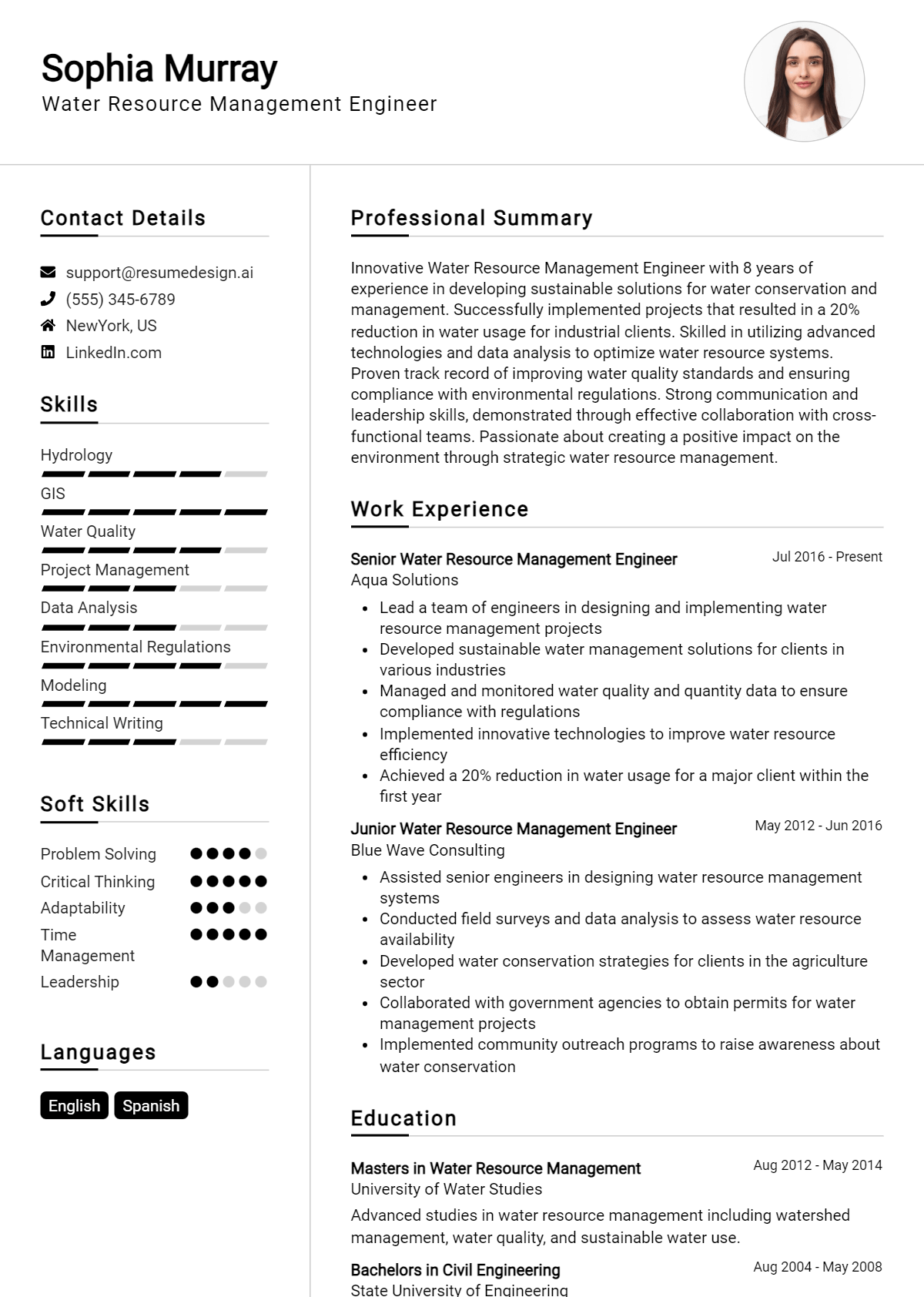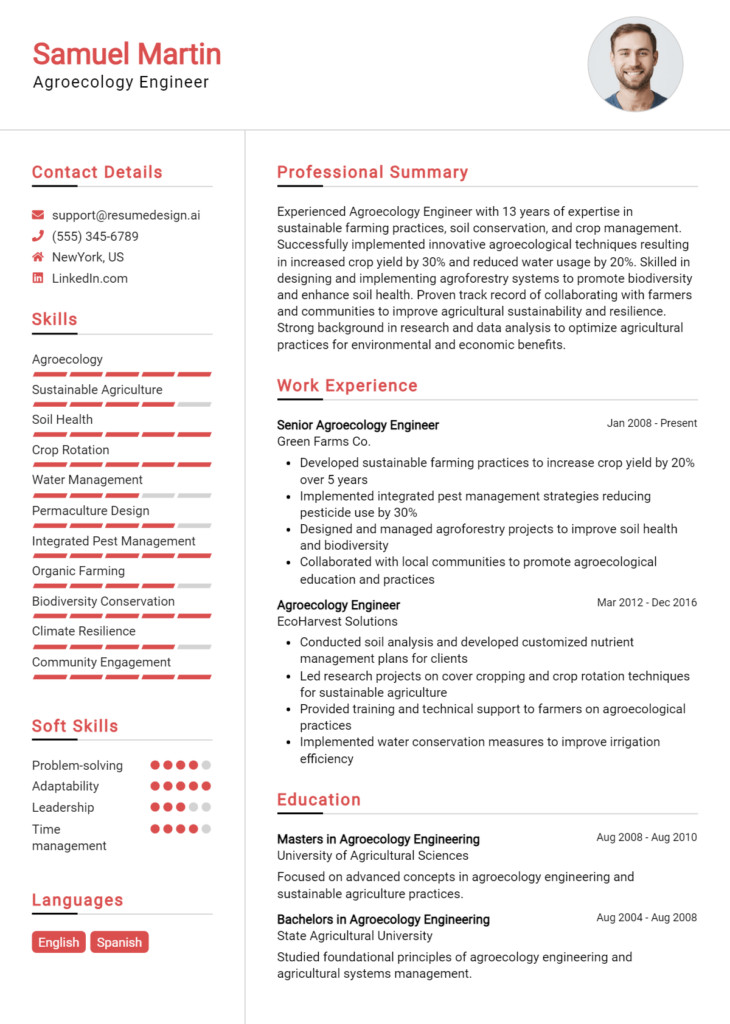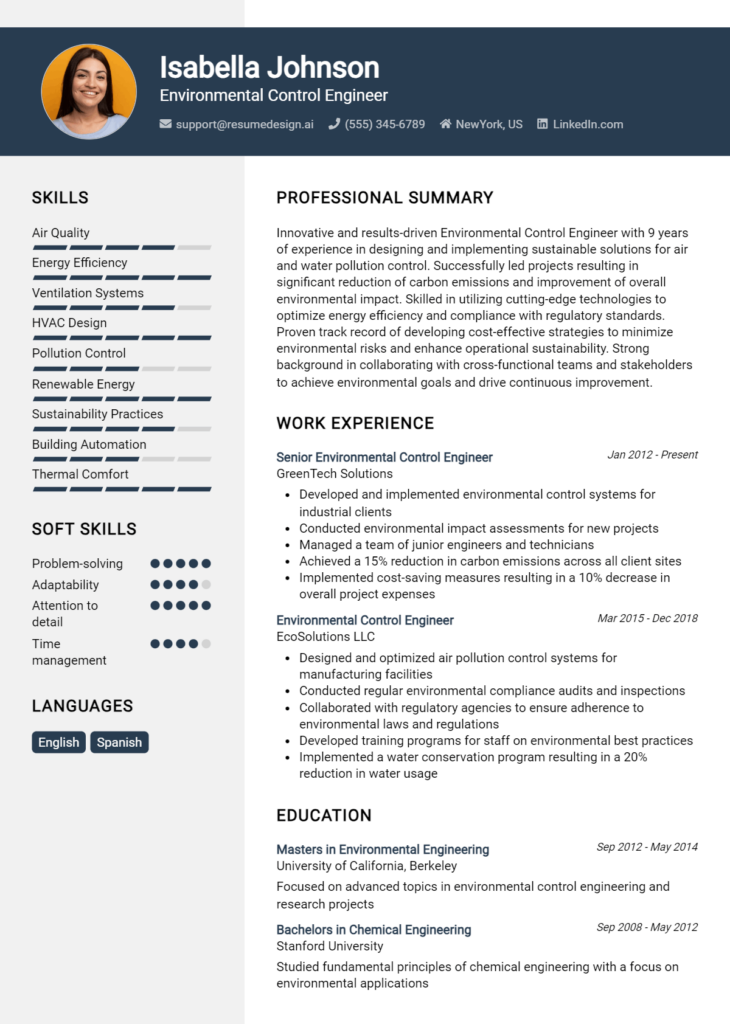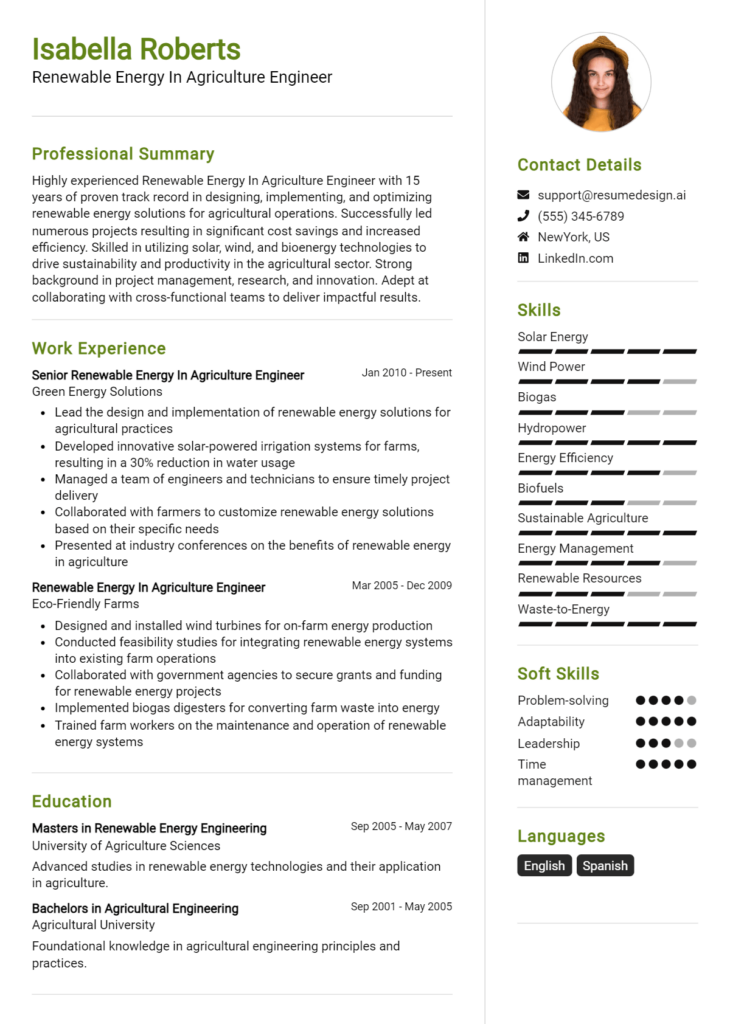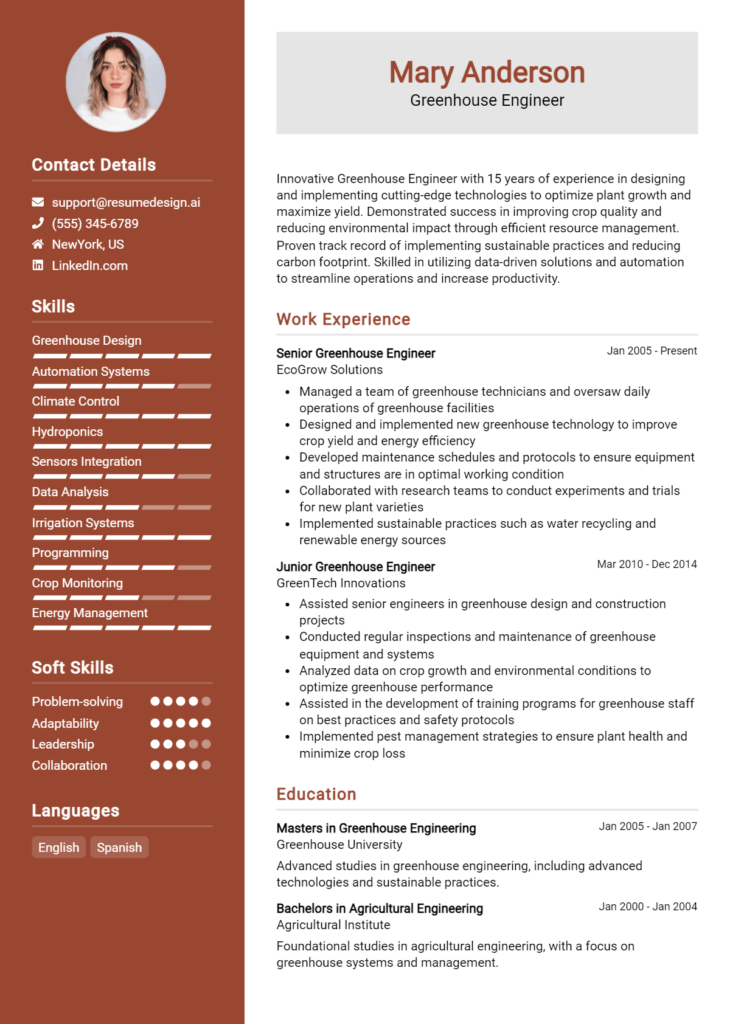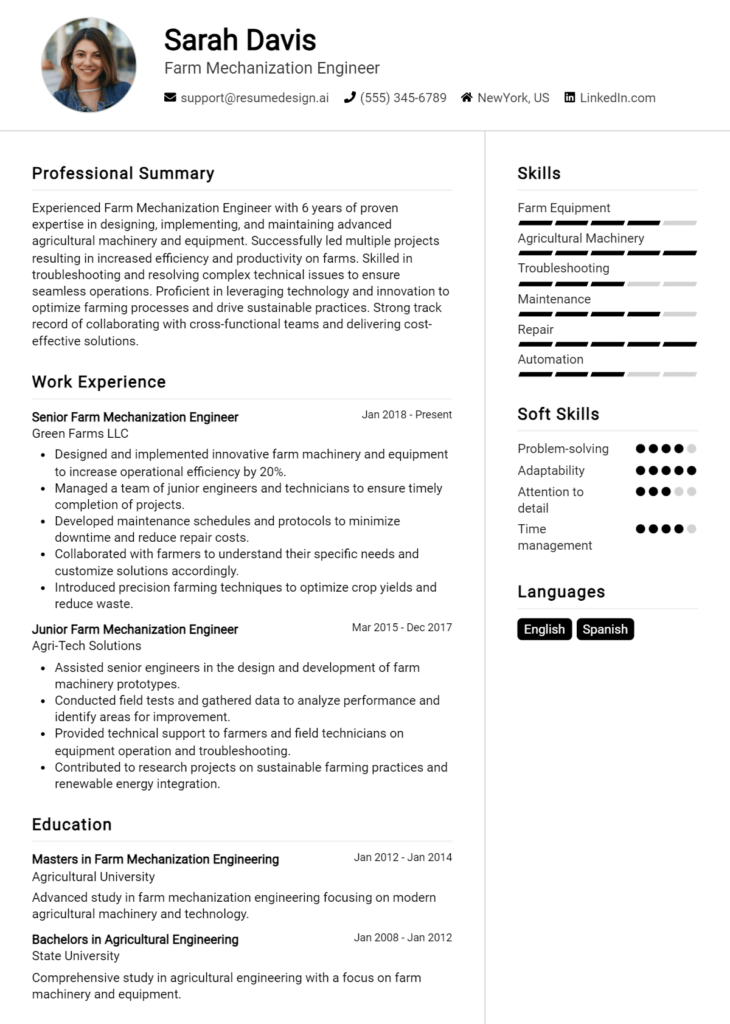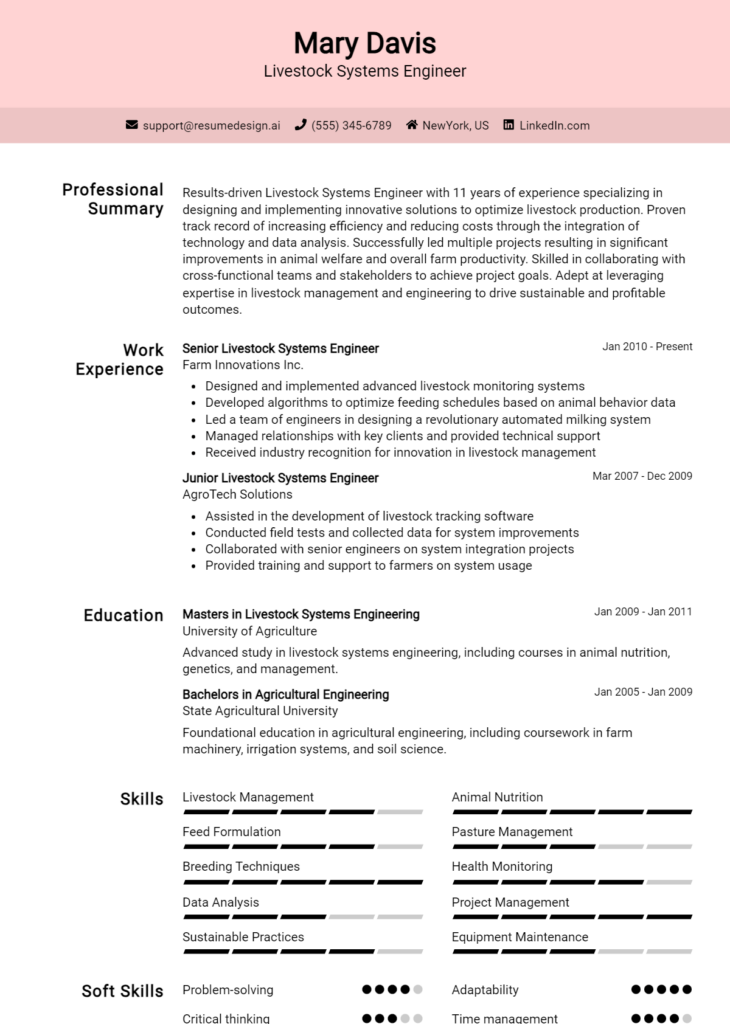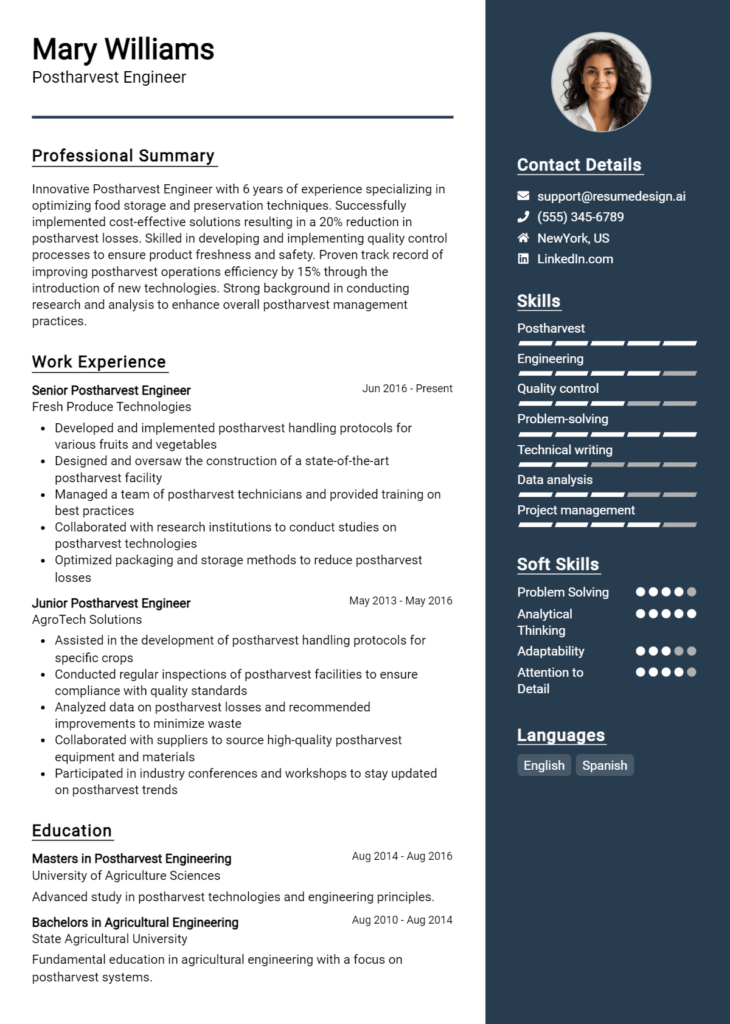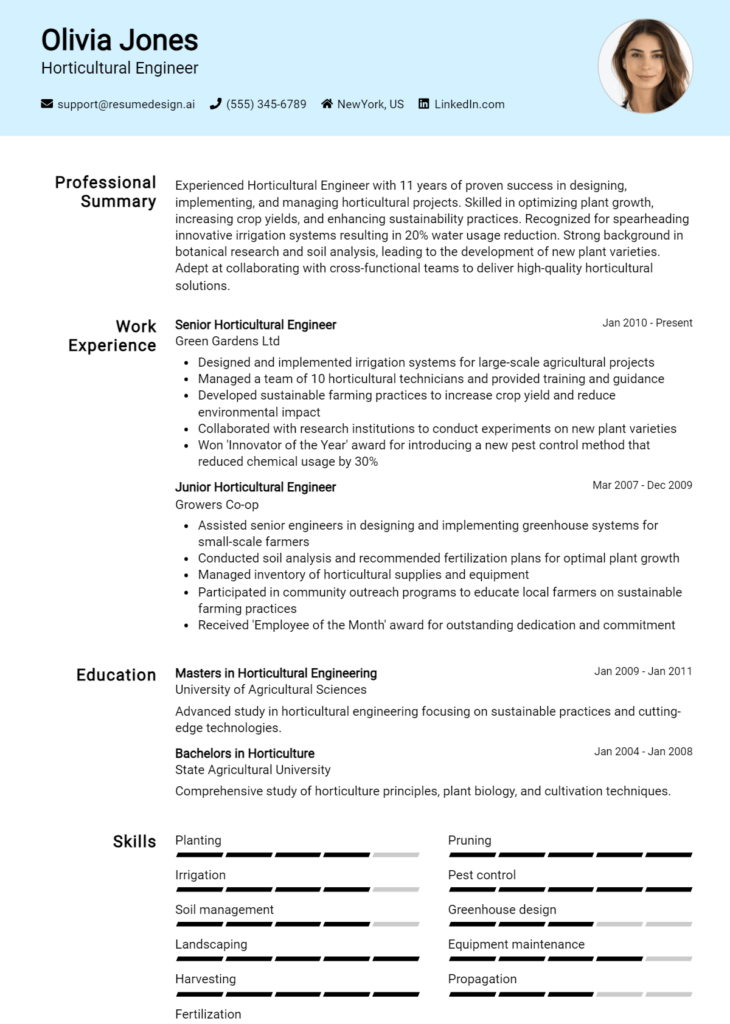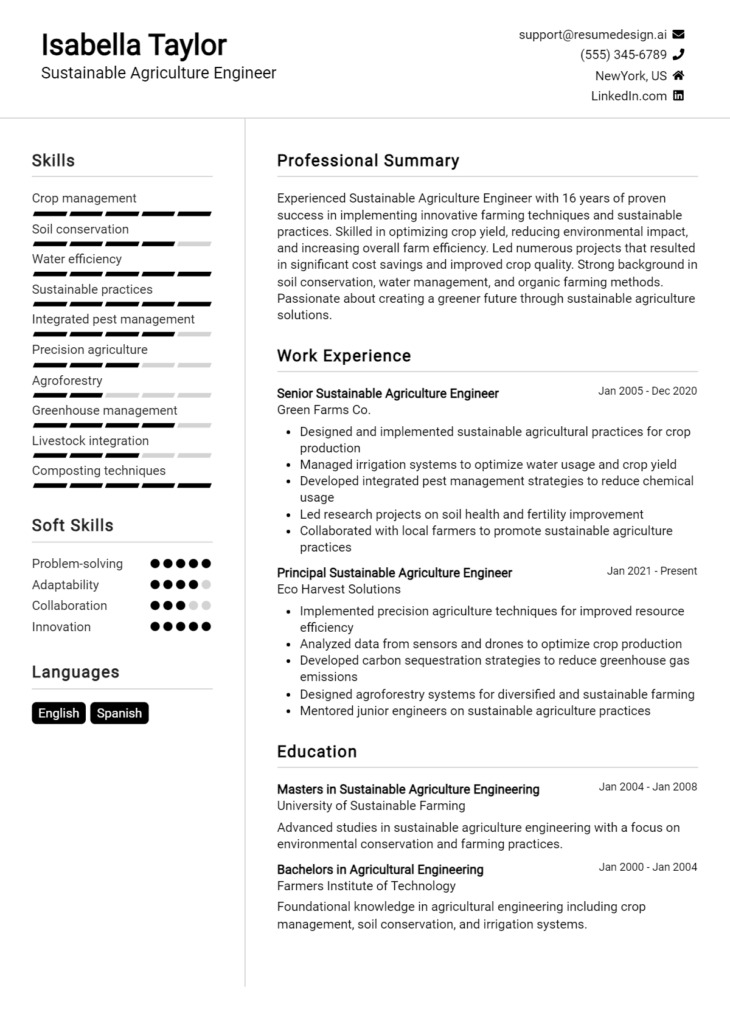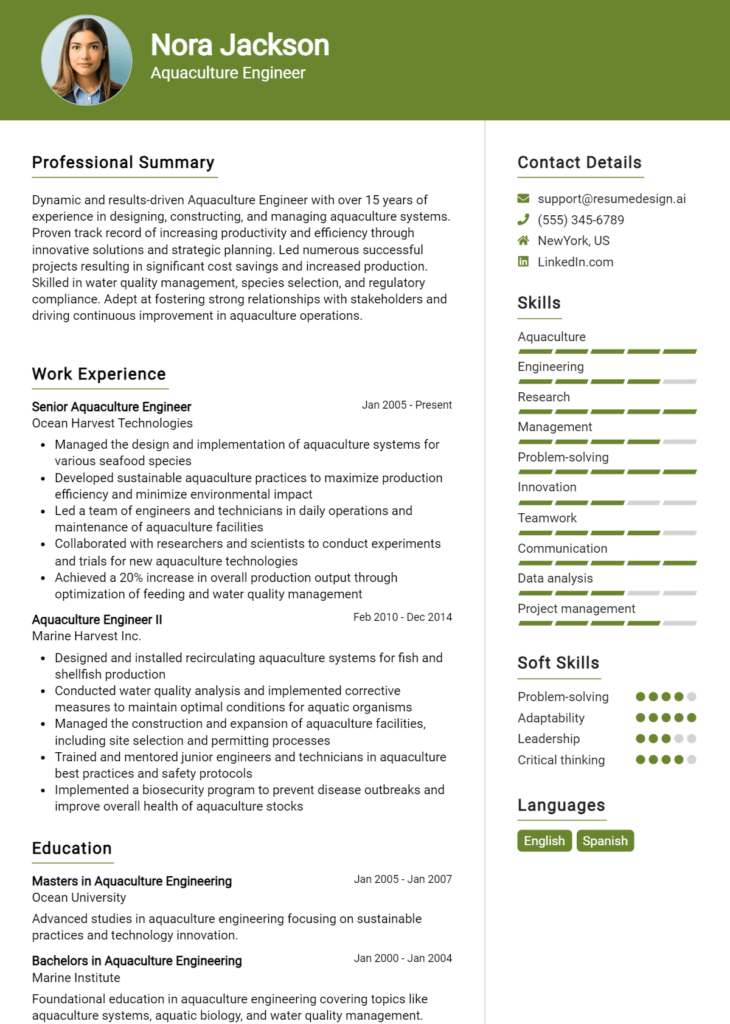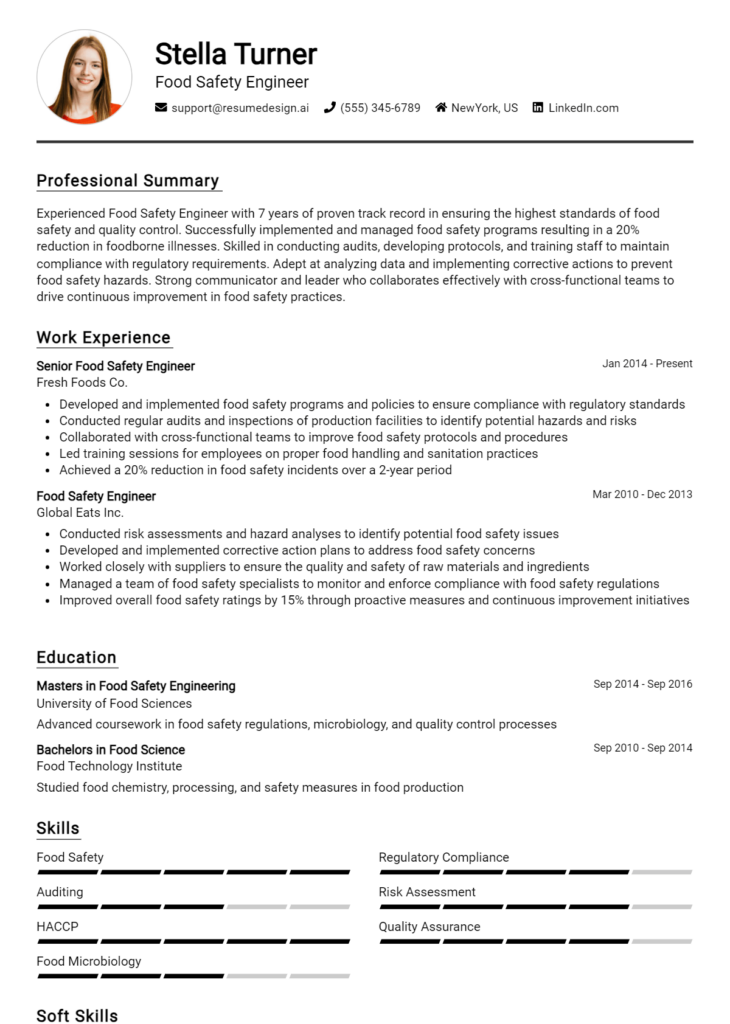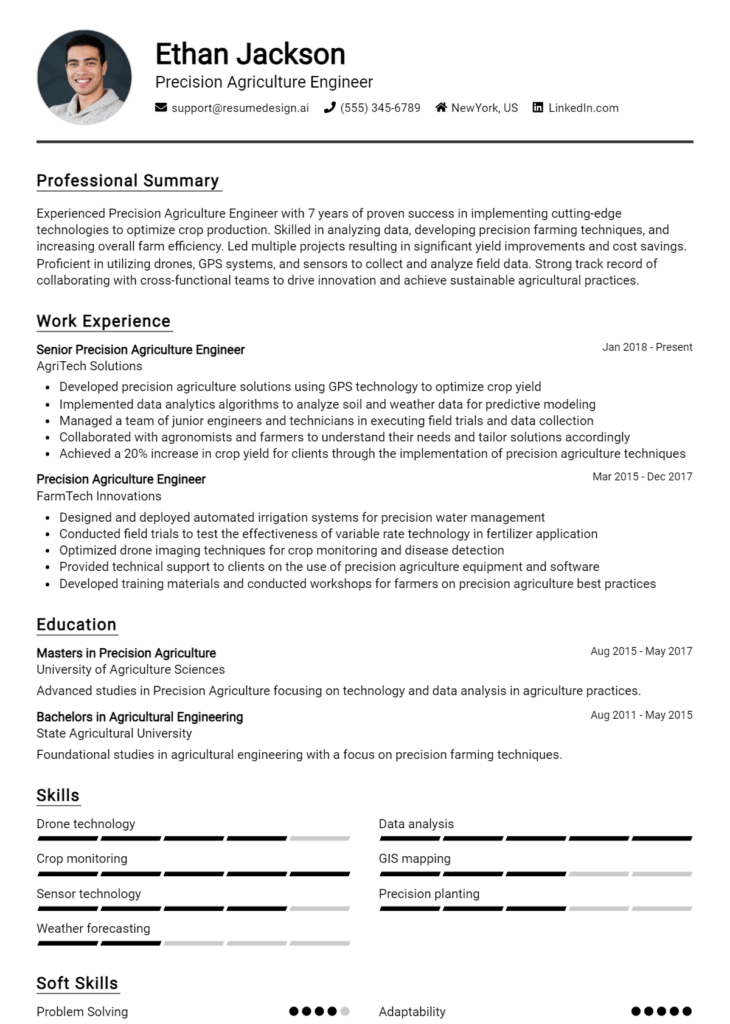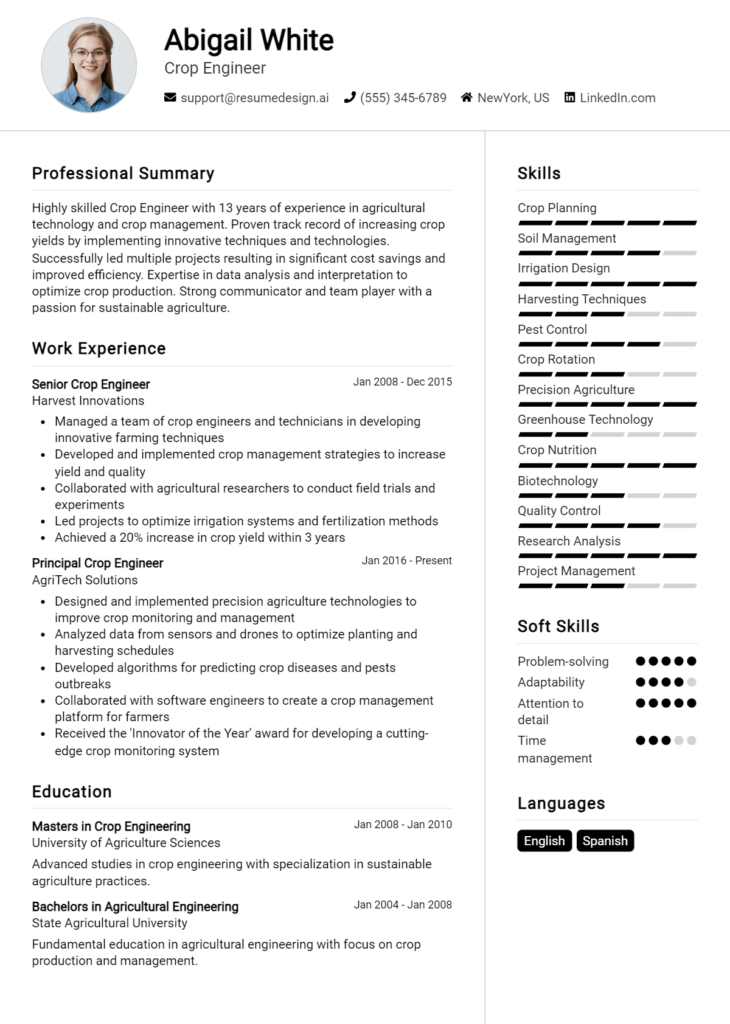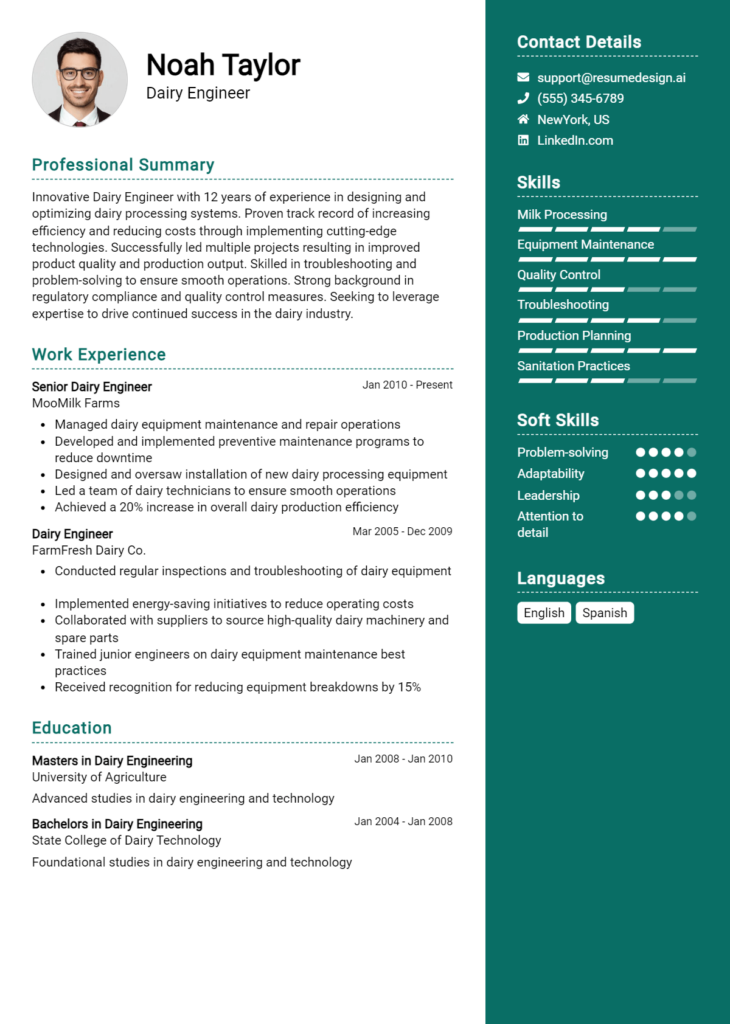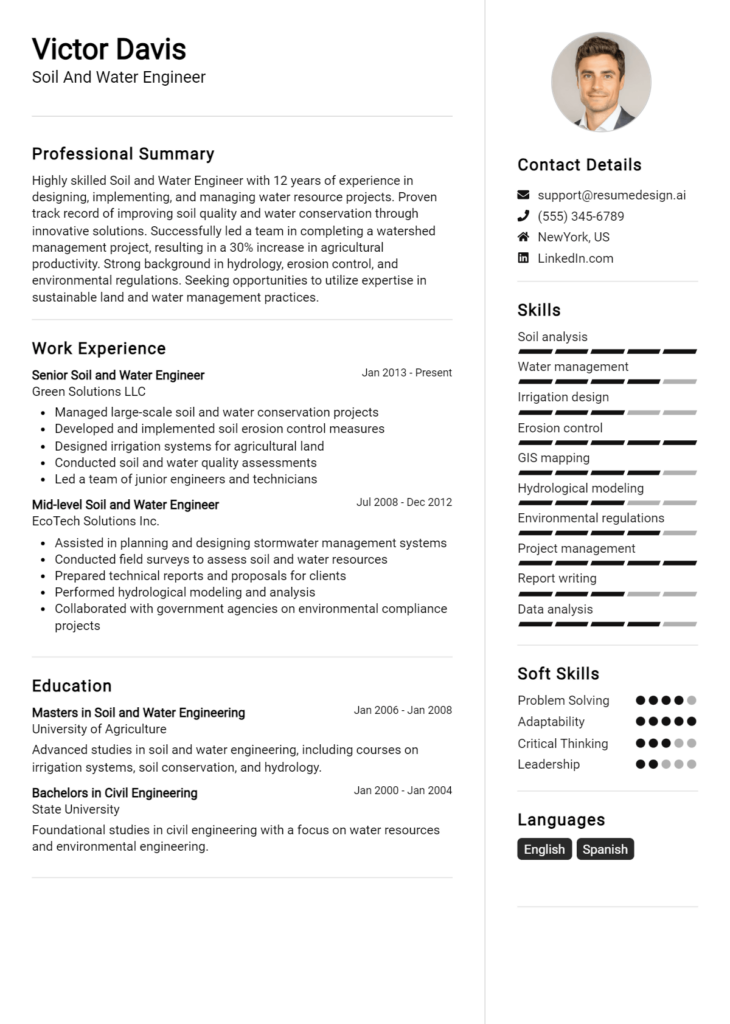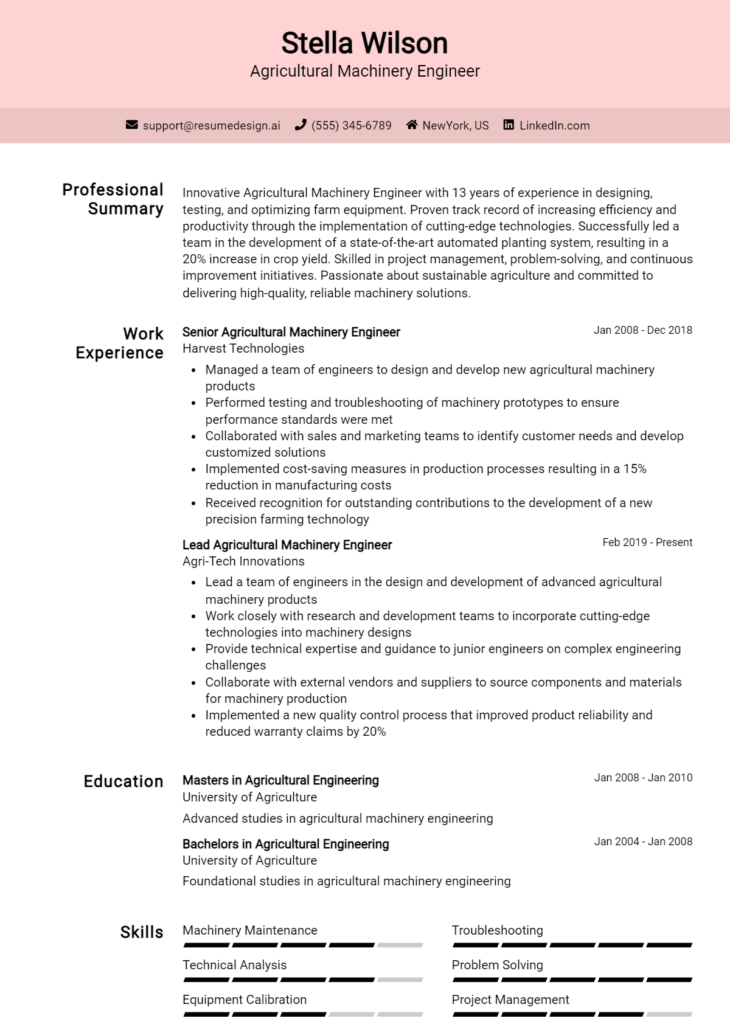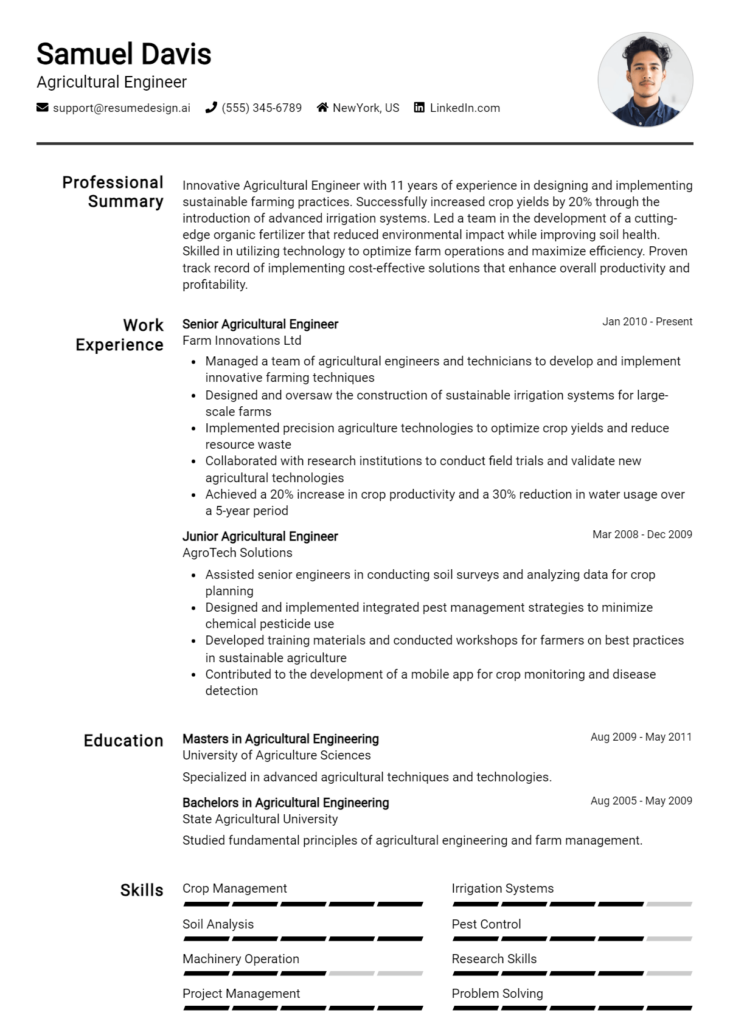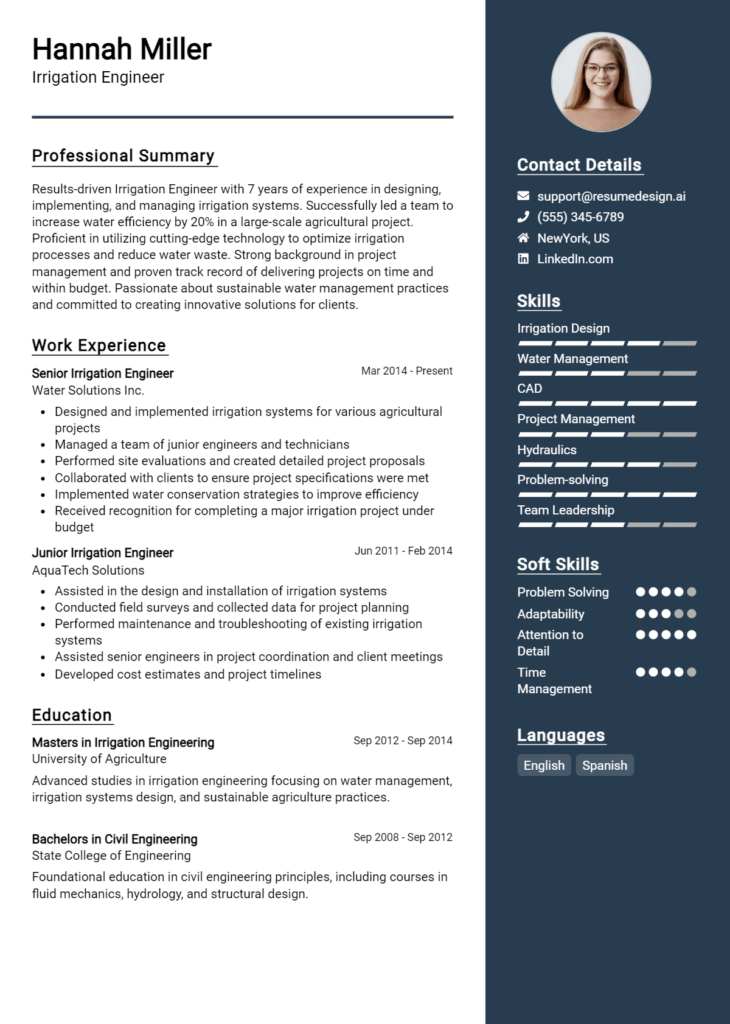Water Resource Management Engineer Core Responsibilities
A Water Resource Management Engineer plays a crucial role in managing and optimizing water resources, requiring a blend of technical, operational, and problem-solving skills. These professionals collaborate across various departments, including environmental, civil, and regulatory sectors, to ensure sustainable water use and compliance with regulations. Their expertise contributes significantly to organizational goals such as resource conservation and environmental protection. A well-structured resume effectively showcases these qualifications, highlighting the candidate's ability to address complex challenges in water management.
Common Responsibilities Listed on Water Resource Management Engineer Resume
- Conducting hydrological studies and water resource assessments.
- Designing and implementing water management systems and infrastructure.
- Developing strategies for flood control and drought mitigation.
- Ensuring compliance with environmental regulations and water quality standards.
- Collaborating with stakeholders, including government agencies and communities.
- Conducting risk assessments related to water resource projects.
- Preparing technical reports and presentations for project proposals.
- Utilizing modeling software for water resource simulation and analysis.
- Monitoring and analyzing water usage data for efficiency improvements.
- Participating in public outreach and education programs regarding water conservation.
- Identifying funding opportunities for water resource projects.
- Providing expert advice on water policy development and implementation.
High-Level Resume Tips for Water Resource Management Engineer Professionals
In today's competitive job market, a well-crafted resume is essential for Water Resource Management Engineer professionals seeking to make a lasting impression on potential employers. Your resume is often the first opportunity you have to showcase your skills, experience, and achievements to a hiring manager, making it crucial that it accurately reflects your qualifications and expertise in the field. A strong resume not only highlights your technical abilities but also demonstrates your understanding of industry challenges and your capacity to solve them. This guide will provide practical, actionable resume tips specifically tailored for Water Resource Management Engineer professionals, helping you stand out in a crowded applicant pool.
Top Resume Tips for Water Resource Management Engineer Professionals
- Tailor your resume to each job application by closely aligning your skills and experiences with the specific requirements outlined in the job description.
- Highlight relevant experience in water resource management, including project work, internships, and any volunteer activities related to the field.
- Quantify your achievements by using specific metrics, such as water savings percentages, project budgets managed, or the size of teams led.
- Emphasize industry-specific skills, such as hydrology, watershed management, water quality analysis, and relevant software proficiency (e.g., GIS, AutoCAD).
- Include certifications and licenses that demonstrate your expertise, such as Professional Engineer (PE) or Certified Water Resource Professional (CWRP).
- Showcase your problem-solving abilities by providing examples of challenges you faced and how you successfully addressed them in past projects.
- Incorporate keywords from the job listing to help your resume pass through Applicant Tracking Systems (ATS) and capture the attention of hiring managers.
- Maintain a clear and professional format, ensuring your resume is easy to read and free of grammatical errors.
- Utilize a strong summary statement at the top of your resume that encapsulates your career goals and key qualifications related to water resource management.
- Include professional affiliations and memberships in relevant organizations, such as the American Water Resources Association (AWRA), to display your commitment to the field.
By implementing these tips, you can significantly enhance your resume and increase your chances of landing a job in the Water Resource Management Engineer field. A focused and well-structured resume will not only showcase your qualifications effectively but also demonstrate your dedication and passion for managing our valuable water resources.
Why Resume Headlines & Titles are Important for Water Resource Management Engineer
In the competitive field of water resource management engineering, a well-crafted resume headline or title is crucial for making a memorable first impression. This succinct phrase serves as the candidate's first opportunity to capture the attention of hiring managers, effectively summarizing key qualifications and expertise in just a few words. A strong headline must be concise, relevant, and directly aligned with the job being applied for, allowing hiring managers to quickly assess the candidate's fit for the role and enticing them to delve deeper into the resume.
Best Practices for Crafting Resume Headlines for Water Resource Management Engineer
- Keep it concise: Aim for a headline that is brief yet descriptive, ideally under ten words.
- Be role-specific: Tailor the headline to reflect the specific position you are applying for.
- Highlight key skills: Include relevant technical skills or certifications that set you apart.
- Incorporate achievements: Use quantifiable accomplishments to demonstrate your impact in previous roles.
- Use industry keywords: Integrate terminology that aligns with the water resource management field.
- Maintain professionalism: Ensure the tone is formal and suitable for a technical profession.
- Avoid jargon: Ensure clarity by avoiding overly complex or niche language that may confuse readers.
- Revise and refine: Continuously update and improve your headline based on job descriptions and feedback.
Example Resume Headlines for Water Resource Management Engineer
Strong Resume Headlines
"Innovative Water Resource Management Engineer with 10+ Years of Experience in Sustainable Practices"
“Expert in Hydrological Modeling and Water Quality Management with Proven Results”
“Dedicated Environmental Engineer Specializing in Integrated Water Resource Management”
“Results-Driven Water Resource Engineer with Successful Project Leadership in Urban Development”
Weak Resume Headlines
“Engineer Looking for Opportunities”
“Water Resource Engineer”
“Experienced Professional Seeking Job”
Strong resume headlines are effective because they clearly articulate the candidate's expertise, experience, and unique qualifications in a way that directly relates to the position being sought. They provide hiring managers with a quick overview of what the candidate brings to the table, making them more likely to engage further with the resume. In contrast, weak headlines fall short because they are vague and lack specificity, failing to convey the candidate's strengths or relevance to the job, which can lead to missed opportunities.
Writing an Exceptional Water Resource Management Engineer Resume Summary
In the competitive field of water resource management, a well-crafted resume summary is essential for distinguishing yourself as a candidate. This brief introductory paragraph serves as your first impression on hiring managers, quickly capturing their attention by highlighting your key skills, relevant experience, and notable accomplishments. A strong summary not only showcases your qualifications but also aligns them with the specific requirements of the job you are applying for. It should be concise and impactful, ensuring that you make a memorable statement within the first few lines of your resume.
Best Practices for Writing a Water Resource Management Engineer Resume Summary
- Quantify Achievements: Use specific numbers and metrics to demonstrate your impact in previous roles.
- Highlight Relevant Skills: Focus on the skills that are most pertinent to the job description.
- Tailor Your Summary: Customize your summary for each position by incorporating keywords from the job listing.
- Keep It Concise: Aim for 3-5 sentences that encapsulate your experience without overwhelming the reader.
- Use Action Verbs: Start sentences with strong action verbs to convey your contributions effectively.
- Showcase Industry Knowledge: Mention relevant technologies, regulations, or methodologies you are familiar with.
- Emphasize Problem-Solving: Highlight your ability to address and solve water resource challenges.
- Maintain Professional Tone: Use professional language that reflects your expertise in the field.
Example Water Resource Management Engineer Resume Summaries
Strong Resume Summaries
Results-driven Water Resource Management Engineer with over 8 years of experience in developing sustainable water management systems. Successfully reduced water waste by 30% in urban areas through innovative engineering solutions and collaborative community engagement.
Detail-oriented engineer specializing in hydrological modeling and water quality assessment, with a proven track record of managing projects valued at over $2 million. Expertise in regulatory compliance and stakeholder communication, ensuring project success from inception to completion.
Dynamic Water Resource Management Engineer with 5 years of experience in designing stormwater management systems. Spearheaded a project that improved water retention rates by 25%, significantly enhancing local ecosystem health and community resilience to flooding.
Weak Resume Summaries
Water Resource Management Engineer with experience in engineering. Looking for a job in a water-related field.
I have worked on various projects related to water management and have some knowledge of water systems. I am eager to apply my skills.
The strong resume summaries are effective because they provide specific achievements, quantify results, and demonstrate a clear alignment with the role of a Water Resource Management Engineer. Each summary highlights relevant skills and accomplishments that convey the candidate's value to potential employers. In contrast, the weak summaries are vague and lack measurable outcomes, failing to capture the attention of hiring managers or reflect a deep understanding of the role, making them less impactful.
Work Experience Section for Water Resource Management Engineer Resume
The work experience section is a vital component of a Water Resource Management Engineer's resume, as it effectively showcases the candidate's technical skills, leadership abilities, and capacity to deliver high-quality projects. This section not only highlights the practical knowledge gained through previous roles but also demonstrates how the candidate has applied that knowledge to achieve tangible results. By quantifying achievements and aligning experiences with industry standards, candidates can illustrate their contributions to water resource management and their potential value to future employers.
Best Practices for Water Resource Management Engineer Work Experience
- Focus on specific technical skills relevant to water resource management, such as hydrological modeling and water quality assessment.
- Quantify achievements where possible, using metrics like percentage improvements, cost savings, or project scope to demonstrate impact.
- Highlight collaborative projects that showcase teamwork, including coordination with government agencies, environmental organizations, and community stakeholders.
- Use action verbs to convey leadership and initiative, such as "designed," "implemented," "coordinated," and "managed."
- Align experiences with industry standards and trends, emphasizing relevant certifications or compliance with regulations.
- Include project examples that demonstrate problem-solving abilities and innovative approaches to complex water resource challenges.
- Detail any mentorship or training roles that illustrate your capacity to lead and develop other professionals in the field.
- Keep descriptions concise and focused, ensuring clarity while providing enough detail to convey expertise.
Example Work Experiences for Water Resource Management Engineer
Strong Experiences
- Led a team of engineers in the design and implementation of a watershed management plan that reduced sediment runoff by 30%, improving local water quality and earning recognition from the EPA.
- Managed a $2 million water conservation project that achieved a 25% reduction in municipal water usage over three years, resulting in significant cost savings for the city.
- Collaborated with multidisciplinary teams to develop a comprehensive flood mitigation strategy that successfully protected over 500 homes from potential flood damage, utilizing advanced hydrological modeling techniques.
- Conducted water quality assessments for a regional river system, identifying critical pollution sources and leading to the implementation of remedial actions that improved water quality by 40% within two years.
Weak Experiences
- Worked on various water-related projects that involved some team collaboration.
- Assisted in the management of water resource efforts without specific outcomes or metrics.
- Participated in environmental assessments but did not lead any initiatives or demonstrate impact.
- Helped with data collection for water quality studies without describing the results or implications of the work.
The examples listed above highlight the distinction between strong and weak experiences. Strong experiences provide quantifiable outcomes, demonstrate technical leadership, and convey collaboration with stakeholders, clearly illustrating the candidate’s contributions to water resource management. In contrast, weak experiences lack specificity, measurable results, and clear impact, making it difficult for potential employers to assess the candidate’s qualifications and effectiveness in previous roles.
Education and Certifications Section for Water Resource Management Engineer Resume
The education and certifications section of a Water Resource Management Engineer resume is crucial for demonstrating the candidate's academic foundation and their commitment to professional development. This section not only showcases relevant degrees but also highlights industry-recognized certifications and specialized training that align with the responsibilities of the role. By providing details on coursework and certifications, candidates can significantly enhance their credibility, showcasing their preparedness to tackle the challenges in water resource management and indicating a proactive approach to continuous learning in this vital field.
Best Practices for Water Resource Management Engineer Education and Certifications
- List relevant degrees first, such as a Bachelor's or Master's in Environmental Engineering, Civil Engineering, or a related field.
- Include industry-recognized certifications, such as Certified Water Resource Professional (CWRP) or Professional Engineer (PE) license.
- Provide specific coursework that pertains to water resource management, hydrology, or environmental science.
- Highlight any specialized training programs or workshops that enhance your expertise in water resource management.
- Ensure that the certifications listed are current and valid, demonstrating commitment to ongoing professional development.
- Tailor the education and certifications section to match the job description, emphasizing qualifications that are most relevant to the position.
- Consider including GPA or honors if they are impressive and relevant to the field.
- Avoid listing irrelevant degrees or certifications that do not add value to the application.
Example Education and Certifications for Water Resource Management Engineer
Strong Examples
- Bachelor of Science in Environmental Engineering, University of California, Berkeley, 2020
- Master of Science in Water Resources Management, Stanford University, 2022
- Certified Water Resource Professional (CWRP), National Association of Water Professionals, 2023
- Relevant Coursework: Hydrology, Water Quality Management, and Sustainable Water Resources Planning
Weak Examples
- Bachelor of Arts in History, State University, 2018
- Certification in Basic First Aid, Red Cross, 2021
- Coursework in Creative Writing and Literature
- Outdated certification in Water Treatment Technology, expired 2022
The examples provided illustrate the distinction between strong and weak qualifications. Strong examples demonstrate relevant educational backgrounds, certifications, and coursework closely aligned with the responsibilities of a Water Resource Management Engineer, showcasing the candidate's readiness for the role. In contrast, weak examples highlight degrees and certifications that do not pertain to the field, lack relevance, or are outdated, which can diminish the candidate's appeal to potential employers.
Top Skills & Keywords for Water Resource Management Engineer Resume
In the field of water resource management, the role of an engineer is pivotal in ensuring sustainable and efficient use of water resources. A well-crafted resume for a Water Resource Management Engineer should highlight both hard and soft skills, as these competencies are essential for addressing complex challenges in water systems. Employers seek candidates who not only possess technical expertise but also exhibit strong interpersonal skills, enabling them to collaborate effectively with multidisciplinary teams, stakeholders, and the community. By showcasing a balanced mix of skills, candidates can demonstrate their preparedness for the demands of the job and their commitment to promoting water sustainability.
Top Hard & Soft Skills for Water Resource Management Engineer
Soft Skills
- Problem-solving
- Communication
- Teamwork and collaboration
- Critical thinking
- Project management
- Adaptability
- Attention to detail
- Leadership
- Conflict resolution
- Time management
Hard Skills
- Hydrology and hydraulics
- Water quality analysis
- Geographic Information Systems (GIS)
- Environmental impact assessment
- Water resource modeling
- Regulatory compliance (e.g., EPA standards)
- Data analysis and statistical methods
- Civil engineering principles
- Water treatment processes
- Sustainable design practices
By integrating these skills into your resume, along with relevant work experience, you can create a compelling narrative that showcases your qualifications as a Water Resource Management Engineer.
Stand Out with a Winning Water Resource Management Engineer Cover Letter
Dear [Hiring Manager's Name],
I am writing to express my enthusiasm for the Water Resource Management Engineer position at [Company Name], as advertised on [Where You Found the Job Posting]. With a robust background in civil engineering and a deep commitment to sustainable water resource management, I am excited about the opportunity to contribute to your team. My comprehensive experience in hydrology, water quality assessment, and project management aligns well with the requirements of this role, making me a strong candidate for the position.
In my previous role at [Previous Company Name], I successfully led projects that improved water conservation practices and optimized the use of natural resources. I collaborated with multidisciplinary teams to design and implement advanced water treatment solutions, which reduced waste and ensured compliance with environmental regulations. My hands-on experience with Geographic Information Systems (GIS) and hydrological modeling software has enabled me to accurately analyze data and make informed decisions that enhance water management strategies. I am particularly proud of a project where I developed a water management plan that resulted in a 20% reduction in water consumption for a local agricultural sector, demonstrating my ability to blend technical skills with practical applications.
I am particularly drawn to [Company Name] because of its commitment to innovation and sustainability in water resource management. I admire your recent initiatives in [mention any specific project or initiative by the company], and I am eager to bring my expertise in water resource engineering to support these efforts. I am confident that my proactive approach to problem-solving, along with my strong communication skills, will allow me to effectively collaborate with stakeholders and contribute to successful project outcomes.
Thank you for considering my application. I look forward to the opportunity to discuss how my skills and experiences align with the goals of [Company Name]. I am excited about the possibility of joining your team to help enhance water resource management practices and promote sustainable development.
Sincerely,
[Your Name]
[Your Contact Information]
Common Mistakes to Avoid in a Water Resource Management Engineer Resume
When crafting a resume for a Water Resource Management Engineer position, it's crucial to present your qualifications and experience effectively. However, many candidates make common mistakes that can hinder their chances of landing an interview. Understanding these pitfalls can help you create a more impactful resume that highlights your expertise in water resource management. Here are some mistakes to avoid:
Generic Objective Statement: Using a vague or generic objective statement can make your resume blend in with others. Tailor it to reflect your specific goals and the value you can bring to the prospective employer.
Overloading with Technical Jargon: While it's important to showcase your technical skills, overwhelming the reader with excessive jargon can be counterproductive. Strike a balance by using clear language that conveys your expertise without alienating potential employers.
Neglecting Soft Skills: Water resource management isn’t solely about technical abilities; it also requires strong communication, teamwork, and problem-solving skills. Failing to highlight these can result in an incomplete picture of your capabilities.
Lack of Quantifiable Achievements: Simply listing job responsibilities without quantifying your achievements can make your experience seem less impactful. Use metrics and specific outcomes to demonstrate the success of your projects.
Failing to Tailor the Resume: Sending out a generic resume can lead to missed opportunities. Tailor your resume for each position by aligning your skills and experience with the job description.
Ignoring Formatting and Organization: A cluttered or poorly organized resume can be difficult to read. Use clear headings, bullet points, and consistent formatting to guide the reader through your qualifications.
Forgetting to Update Contact Information: Always double-check that your contact information is current. An outdated phone number or email address can prevent potential employers from reaching you.
Including Irrelevant Experience: While it’s important to show a diverse skill set, including unrelated job experiences can dilute the focus of your resume. Prioritize experiences that directly relate to water resource management for a more cohesive presentation.
Conclusion
As we explored the vital role of a Water Resource Management Engineer, it became clear that this position is essential for sustainable water use, conservation, and management. Key responsibilities include assessing water resources, designing water management systems, and implementing strategies to enhance water efficiency. The demand for skilled professionals in this field is growing, driven by climate change, population growth, and the need for sustainable practices.
To ensure that you stand out in this competitive field, it’s crucial to have a polished resume that highlights your relevant skills and experiences. Take a moment to review your Water Resource Management Engineer resume and make sure it accurately reflects your qualifications and achievements.
To assist you in this process, we offer a variety of resources including resume templates, a comprehensive resume builder, and resume examples that can serve as inspiration. Additionally, don’t forget to check out our cover letter templates to complement your application.
Now is the time to take action—ensure your resume shines as brightly as your skills in water resource management!

